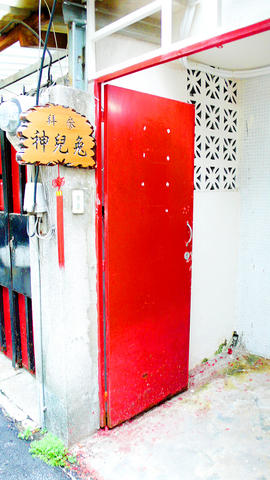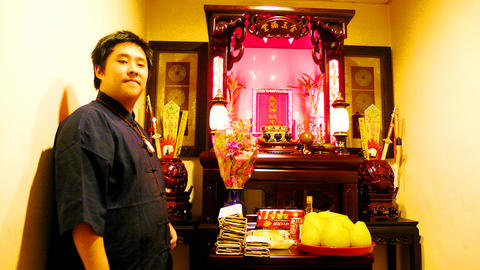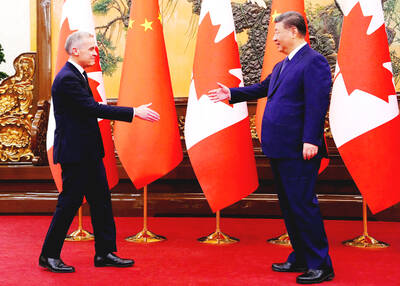On an overcast weekday afternoon, two men in their 20s walked into an unassuming temple nestled in an apartment building in Yonghe City (永和市). "We've been here before. We know the way," they told the priest's assistant, and proceeded to the altar on the second floor. A few minutes later, another young man went downstairs to have his fortune told by Lu Wei-ming (盧威明), a Taoist priest, or fashi (法師). Lu established and tends this shrine, known as the Rabbit Temple (兔兒廟), which is devoted to the rabbit deity (兔兒神) - the patron god of homosexuals.
The god isn't very well known, nor commonly worshipped, but he is based on an historical figure. According to the Tale of the Rabbit God that appears in the Zibuyu (子不語), a collection of supernatural stories written by Qing Dynasty scholar and poet Yuan Mei (袁枚, 1716-1798), Hu Tianbao (?#32993;天保) was an official in 18th-century, Qing Dynasty China. He fell in love with a handsome young imperial inspector of Fujian Province, but because of the inspector's higher status, Hu was afraid to reveal his feelings. After Hu was caught peeping at the inspector through a bathroom wall, he confessed his admiration for the inspector, who had him beaten to death. One month after his passing, the story goes, Hu appeared to a man from his hometown in a dream, claiming that the king of the underworld had appointed him the Rabbit God. As such, his duty was to govern the affairs of men who desire men. In the dream, he asked the man to erect a shrine to him.
As a priest, Lu often heard complaints from homosexual Taoist adherents that there was no god to answer their prayers. Believing one of his missions is to tend to the needs of people alienated from mainstream society, he set out to revive the forgotten deity. As his research suggests, Hu was an upper class historical figure who lived in Fujian from the late Ming Dynasty to the early Qing Dynasty. However, according to Michael Szonyi, associate professor of Chinese history at the department of East Asian Languages and Civilizations at Harvard, the Rabbit God is a pure invention of Yuan, the poet, since the image of the rabbit deity doesn't appear in any other sources from Fujian.

hotos: Ho Yi, Taipei Times
While some aspects of the story may be fabrications, the existence of the cult of Hu Tianbao in Fujian in the 18th century is well documented in official Qing records.
Historical Roots
In his Cult of Hu Tianbao and the 18th-Century Discourse of Homosexuality, which was published in the journal Late Imperial China in 1998, Szonyi discusses the evidence used by the government in its campaign against religious sects. The evidence was given by Zhu Gui (朱珪, 1731-1807), a grain tax who described the iconology of the cult as "two men embracing one another; the face of one is somewhat hoary with age, the other tender and pale." He went on to say that adherents, "on seeing young men desire to have intercourse with them, prayed for assistance from the plaster idol … . Afterwards they plastered the idol's mouth with pork intestine and sugar in thanks."

Photo: Ho Yi, Taipei Times
Later official records suggest that the sect was active in the 19th century, but as Szonyi points out, the chief evidence comes from edicts of imperial officials who tried to suppress the practice, therefore it is impossible to ascertain how the god was perceived from its adherents' point of view.
Lu says that "The deity can be seen as an alternative to Yue Xia Lao Ren (月下老人) [the matchmaker god]. I usually advise gay temple-goers not to go to Yu Lao, [the nickname of the matchmaker god], since love affairs between men and women are believed to be his responsibility. He will be confused by homosexuals' prayers and probably say to himself: 'The prayer doesn't seem right. I'll match you with a woman instead.'"
The Rabbit God is perceived to be an affable deity, Lu said, who is willing to assist his followers in every aspect of life. Since he works for Cheng Huang (城隍), the City God, he has both the erudition and social network in the spiritual world to solve any problem mortals have, according to Lu.
Homosexuals may have an edge in the spiritual world because, "Hu Tianbao is rather self-abased both because of the way he died and the somewhat belittling title of rabbit. So if you are willing to believe in him, he will be much more grateful and work harder than other deities," Lu said.
There are several methods of worshipping, asking for and receiving answers from this divine being, but sincerity is what counts most, Lu said. For this reason, followers should address the god as Ta Yeh (大爺), or master, rather than Rabbit God. Then, those with needs can write down their names, addresses, birthdays and prayers on pieces of paper money and burn them to make sure the messages are sent to heaven.
In another form of worship, personal items can be brought before the alter for Ta Yeh's blessings. Some followers believe that blessed skin-care products are more effective and increase the likelihood of romance. Followers can also take fu (符), paper charms, from the temple, place them under a pillow and pray to the deity to fulfill their wishes before going to bed. To Lu, the praying is meant to encourage contemplation.
sacred to secular
That is the spiritual side of the sect, but Lu is also concerned about the status of homosexuals in society, and that is a major reason for establishing the temple. "Religions both in the West and the East have long pushed the homosexual community into the margin," he said. "But providence is benign, and love is given to all human beings as equals." He also added that the temple is not merely for gay men, but lesbians as well.
Lu is planning religious gay weddings. He wants to deliver a message that religion recognizes the union of homosexual couples, and there is no reason why the state shouldn't do the same.
To a 25-year-old adherent - who requested to be identified as Philippe since his colleagues don't know he is gay - the temple offers a source of comfort in time of trouble. Admitting that he imagined the shrine would be a bit gruesome before the visit, Philippe noted that the whole experience was similar as that of visiting any other temple.
"Although I had a secular upbringing, I still feel the need to seek out comfort in religious faith, to know there is hope I can hold on to, a true love that is not far off," said the young internist, who said he would return to the shrine and give thanks to Ta Yeh if the dinner date after the gay parade last Saturday developed into a long-yearned-for relationship.

On a harsh winter afternoon last month, 2,000 protesters marched and chanted slogans such as “CCP out” and “Korea for Koreans” in Seoul’s popular Gangnam District. Participants — mostly students — wore caps printed with the Chinese characters for “exterminate communism” (滅共) and held banners reading “Heaven will destroy the Chinese Communist Party” (天滅中共). During the march, Park Jun-young, the leader of the protest organizer “Free University,” a conservative youth movement, who was on a hunger strike, collapsed after delivering a speech in sub-zero temperatures and was later hospitalized. Several protesters shaved their heads at the end of the demonstration. A

Google unveiled an artificial intelligence tool Wednesday that its scientists said would help unravel the mysteries of the human genome — and could one day lead to new treatments for diseases. The deep learning model AlphaGenome was hailed by outside researchers as a “breakthrough” that would let scientists study and even simulate the roots of difficult-to-treat genetic diseases. While the first complete map of the human genome in 2003 “gave us the book of life, reading it remained a challenge,” Pushmeet Kohli, vice president of research at Google DeepMind, told journalists. “We have the text,” he said, which is a sequence of

In August of 1949 American journalist Darrell Berrigan toured occupied Formosa and on Aug. 13 published “Should We Grab Formosa?” in the Saturday Evening Post. Berrigan, cataloguing the numerous horrors of corruption and looting the occupying Republic of China (ROC) was inflicting on the locals, advocated outright annexation of Taiwan by the US. He contended the islanders would welcome that. Berrigan also observed that the islanders were planning another revolt, and wrote of their “island nationalism.” The US position on Taiwan was well known there, and islanders, he said, had told him of US official statements that Taiwan had not

Britain’s Keir Starmer is the latest Western leader to thaw trade ties with China in a shift analysts say is driven by US tariff pressure and unease over US President Donald Trump’s volatile policy playbook. The prime minister’s Beijing visit this week to promote “pragmatic” co-operation comes on the heels of advances from the leaders of Canada, Ireland, France and Finland. Most were making the trip for the first time in years to refresh their partnership with the world’s second-largest economy. “There is a veritable race among European heads of government to meet with (Chinese leader) Xi Jinping (習近平),” said Hosuk Lee-Makiyama, director